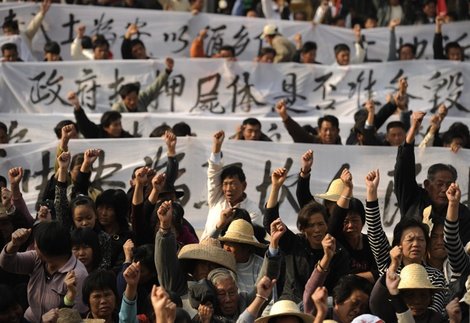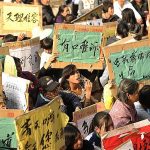Occupy Wukan, Pt. 1: The Leadup Posted by Stephen on Jan 5, 2012 in Uncategorized
 2011 was a year of revolution. From the Arab Spring to the Occupy Wall Street, mass protesting, rioting and police suppression have marked this past tumultuous year. With economic recovery still slow across the globe, and with breakthroughs in social media and mobile tele-communications, people have grown fed up with “business ass usual” and they’ve started talking.
2011 was a year of revolution. From the Arab Spring to the Occupy Wall Street, mass protesting, rioting and police suppression have marked this past tumultuous year. With economic recovery still slow across the globe, and with breakthroughs in social media and mobile tele-communications, people have grown fed up with “business ass usual” and they’ve started talking.
Now nearly anyone, with a few thumb strokes, can start organizing and leading grassroots campaigns to fight the injustices they see around them. Social media has mobilized the masses, and the degree of press coverage is making everyone accountable. Twitter, as it turns out, topples tyrants.
So a few months back, when protests in Wukan or 乌坎 (Wūkǎn), started drawing media attention, people started asking the big question: why? Well here’s the backstory to the Occupy Wukan Movement.
The Backstory:
http://www.youtube.com/watch?v=aOvWA61WFIQ
The Story of Occupy Wukan begins with the jurisdictional breakdown between provincial (state level) and central (federal level) authority. While central party members are often watched with scrutiny for any small slip-up, provincial leaders are turned a blind eye to, and as a result have become exceptionally corrupt throughout China. In Wukan, local corruption has been the catalyst that has sparked protest and retaliation.
Since the abolition of agricultural taxes in 2006, local government has been increasingly raising money through land sales to the extent that this is now a primary revenue stream (and speculation has run rampant because). Conflicts between farmers and local officials have risen throughout China, often because of land seizures (or “land grabs”) for these increasingly more valuable properties.
Over the years, these greedy land grabs have confiscated or stolen property right out from under the villagers. Villagers claim that 400 hectares of farmland have been appropriated without compensation since 1998. They petitioned various levels of government in vain over the years, accused local cadres of “pocketing more than 700 million yuan” of money destined for compensating them since 2006 but local officials blamed villagers for trying to fragment a harmonious society (for them). With little political recourse and growing sense of urgency, villagers decided to unite in the face of blatant corruption. What followed would mark the beginning of the Occupy Wukan movement.
The September Protests:
After years of stewing anger, frustration finally boiled over. On September 21, 2011, hundreds of villagers participated in a sit-in protest against local officials outside government offices in Lufeng. The small protest group–initially about 50 people–yelled slogans and hoisted banners and placards with slogans like “give us back our farmland” and “let us continue farming”.Then as the crowd grew in strength, protesters became restless and started damaging buildings and equipment in an industrial park in the village and blocking roads.Policemen were dispatched, and one villager said that they severely beat some teenagers who were banging on a gong to alert fellow villagers of the protest.
 Three villagers were arrested during the first day’s violence. The next day, the police station was besieged by more than 100 villagers demanding the release of the detained villagers. Violence soon escalated as the news that several youngsters had been seriously injured after being set upon by government ‘thugs’. Within no time, hundreds of irate villagers armed with makeshift weapons to besiege a local police station where 30 to 40 officials were sheltering. Hundreds of well-equipped riot police were dispatched; they engaged in a stand-off with the peasants.
Three villagers were arrested during the first day’s violence. The next day, the police station was besieged by more than 100 villagers demanding the release of the detained villagers. Violence soon escalated as the news that several youngsters had been seriously injured after being set upon by government ‘thugs’. Within no time, hundreds of irate villagers armed with makeshift weapons to besiege a local police station where 30 to 40 officials were sheltering. Hundreds of well-equipped riot police were dispatched; they engaged in a stand-off with the peasants.
Video footage shot by villagers in Wukan showed people of all ages being chased and beaten with truncheons by riot police. One Wukan villager described the police and other security staff as “like mad dogs, beating everyone they saw” including women, children and the elderly:
http://www.youtube.com/watch?v=IkY9K3emAa8
The footage was instantly broadcasted throughout China and instantly drew ire and backlash from China’s netizen community. Soon, the Wukan protesters had won over public opinion in China and through PR and political pressure forced the issue of local greed and corruption onto the national stage.
For more on the Occupy Wukan movement, check out the NyTimes’ Video Journal on Wukan. In the following posts we’ll discuss the December riots, controversial deaths of movement leaders and lasting affect that the Occupy Wukan movement will have on Chinese society in the years to come. Stay tuned.
Follow Steve on twitter: @seeitbelieveit

Build vocabulary, practice pronunciation, and more with Transparent Language Online. Available anytime, anywhere, on any device.
About the Author: Stephen
Writer and blogger for all things China related. Follow me on twitter: @seeitbelieveit -- My Background: Fluent Mandarin speaker with 3+ years working, living, studying and teaching throughout the mainland. Student of Kung Fu and avid photographer and documentarian.




Leave a comment: